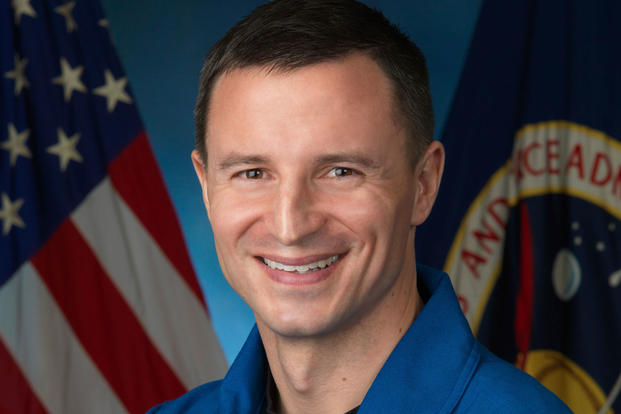JOINT BASE SAN ANTONIO-FORT SAM HOUSTON, Texas -- While many have reached for the stars, a physician who calls Brooke Army Medical Center home is aiming to be the first Army doctor in space.
NASA announced in May that Lt. Col. (Dr.) Andrew Morgan, a NASA astronaut and emergency physician credentialed at BAMC, has been assigned to Expedition 60/61, which is set to launch to the International Space Station in July 2019.
"Joint Base San Antonio and the San Antonio community have been part of my life since childhood," Morgan said. "When I fly in space, I'll be taking Army history, military medicine and this supportive community with me. I'm hugely honored to represent all of that."
Morgan became the first Army Medical Corps officer selected as an astronaut after an arduous selection process in 2013. After five years of training, the officer will make his first voyage to the space station next year on a Russian Soyuz rocket and spacecraft alongside an Italian astronaut and a Russian cosmonaut. Once on board the ISS, he'll join American astronaut Christina Koch and her Russian cosmonaut crewmate who will launch to the ISS in April 2019.
While Morgan is excited about the opportunity to conduct experiments and explore the station, "I'm most looking forward to gazing down at the Earth and doing a few spacewalks," he said.
Morgan's upcoming journey to Earth's orbit is a path paved in his childhood, when a love for science, history and military aviation sparked an interest in space exploration. He recalls living in San Antonio in the mid-1980 when his father was a dental resident at Lackland Air Force Base, Texas.
"I was in third and fourth grade at Braun Station Elementary School at the height of the space shuttle program," he said. "When the space shuttle flew piggyback on a 747 between Florida and California, it occasionally stopped in San Antonio while en route, and from our home near Leon Valley, we could often see this incredible sight as it made its final approach into Kelly AFB. I remember it distinctly and it made a lasting impression on me."
While inspired by space, Morgan's exposure to the military as an Air Force "brat" tipped him in a different direction. He decided to pursue an Army career and earned his bachelor's degree in environmental engineering at the U.S. Military Academy at West Point, followed by a doctorate of medicine from the Uniformed Services University of Health Sciences. His career circled back periodically to San Antonio, whether for courses or clinical rotations at BAMC as a medical student.
Morgan served in the Joint Special Operations Command at Fort Bragg, and went on to become the battalion surgeon for the 1st Battalion, 3rd Special Forces Group. He then embarked on a special operations assignment in Washington, D.C., before completing his sports medicine fellowship.
In 2011, Morgan saw an announcement that NASA was selecting another astronaut class. "I had always been interested in space exploration, but figured I didn't have the right background," he explained. "But I decided to give it a shot anyway."
The selection process took more than 18 months and involved extensive interviews, medical testing and language aptitude testing. With an initial 120 interviewees, NASA eventually narrowed the group to eight astronaut candidates.
Morgan vividly recalls when he received the good news from former astronaut and chair of the selection board, Dr. Janet Kavandi.
"Her first question in the phone call was, 'We wanted to know if you'd like to come to Houston and join our team?' Morgan recalled in a 2013 Army.mil article. "I couldn't believe it; the thought that I had been chosen choked me up. It was surreal."
The selection involved a relocation to Johnson Space Center in Houston where Morgan was slated to start the two-year astronaut candidate training program in July 2013. Once his wife and four children were settled in, the Army officer began to search for a hospital where he could maintain his medical credentials. BAMC immediately came to mind.
"They welcomed me to the staff," he said. "It was incredibly important to me that I maintain my credentials and my military readiness. It's a huge treat for me to make periodic visits to BAMC and interact with residents, service members, patients, military retirees and combat veterans. Fort Sam Houston is the home of military medicine, so it feels like home to me."
Over the two years following his selection, Morgan's training transported him from physician to astronaut. Candidate training included flight training, Russian language proficiency, extra-vehicular activity (space walking), robotics and space station systems and maintenance. "Everybody gets trained to do everything, no matter what your professional background might be," he explained.
After candidate training, Morgan focused his attention on spacesuit development and researching injuries caused by spacesuits. Now assigned to a flight, he'll undergo in depth refresher training over the next year to prep him for his upcoming trip.
Morgan cites his military experience and training as keys to his success. "At the core, I was selected as an astronaut because they saw a unique set of skills. Everything I brought to the table was given to me by the Army -- my undergraduate and graduate education, residency, and operational experiences."
Army Col. Bret Ackermann, BAMC's deputy commander for surgical services, has served alongside Morgan in past assignments for more than a decade. "We are all very proud of Drew and his well-earned success," he said.
BAMC Commanding General Brig. Gen. (Dr.) George N. Appenzeller, a fellow emergency medicine physician, is also aware of Morgan's stellar reputation. "Drew's service and leadership is always about the team.....his patients, colleagues, and their Families. We are looking forward to his leadership from space next year."












